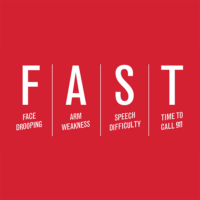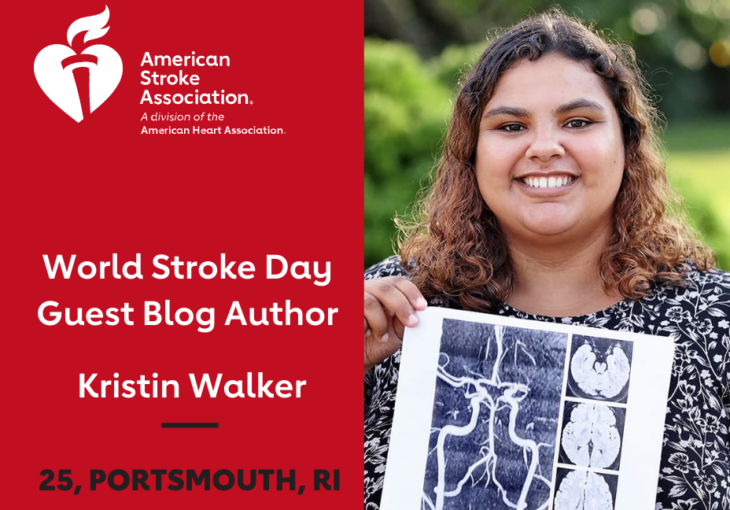At 23 years old, Portsmouth local, Kristin Walker, survived a stroke. This World Stroke Day, Kristin, now 25 years old bravely shares her story to help spread the importance of stroke awareness, at any age.
 I typically have a big smile on my Face; but the night of September 8th, 2019 my left side was drooping. I woke up around 3 AM and tried to grab my phone on my bed. I dropped it on the floor, “I am just tired,” I thought to myself. While trying to pick it up, I stumbled and could not grasp it. Finally, on the third attempt, I had my phone. I then took a wobbly step, opened my bedroom door, and fell backward knocking over my metal trash bin. Thankfully, my mom woke up and approached me worryingly. I tried to tell her I was simply tired and to go back to sleep—yet these words came out jumbled. My mom was the first to recognize I was having a stroke.
I typically have a big smile on my Face; but the night of September 8th, 2019 my left side was drooping. I woke up around 3 AM and tried to grab my phone on my bed. I dropped it on the floor, “I am just tired,” I thought to myself. While trying to pick it up, I stumbled and could not grasp it. Finally, on the third attempt, I had my phone. I then took a wobbly step, opened my bedroom door, and fell backward knocking over my metal trash bin. Thankfully, my mom woke up and approached me worryingly. I tried to tell her I was simply tired and to go back to sleep—yet these words came out jumbled. My mom was the first to recognize I was having a stroke.
I was continually asked, “lift both of your Arms,” throughout my five-day stay in the hospital. Despite my inability to raise and hold my left arm or leg, I received various responses from medical personnel. The EMTs suggested I did not need to receive emergency transportation (my mom drove me to the hospital), and an ER doctor said it was a ‘complicated migraine’ that mimics symptoms of a stroke. To be cautious, I received an MRI. About 20 hours after I dropped my phone, I finally learned I had a stroke as a result of a blood clot in a main artery (Ischemic Stroke). Learn more about Ischemic Strokes here.
It felt as if my mind and my body were separate entities; each struggling to perform what I wanted them to. The first time I fully understood the extent of the damage was when asked to draw a clock showing 10 minutes after 11; I could barely draw a circle, drew 1 where 12 should be, and made several mistakes with number placement and order. I cried that night. The previous week I was writing codes for data analysis and now a simple clock tripped me up. I cried, but I also made promises to myself that I believe helped me recover: to be relentless with my recovery, be stubborn because this is my journey, and be humorous whenever possible (it would be too overwhelming if not). I was able to gain back previously taken for granted abilities through arduous pegboards at OT, dreaded stairs at PT, and mentioning Michael B. Jordan in all my Speech sessions to distract myself from my word-finding difficulties.
We young people can think we are invincible; I was 23 and never thought I would experience this traumatic and life-changing event. I am grateful for a metal trash bin and that my mom knew the signs of a stroke and did not dismiss them in a young person as many others did. Receiving medical attention and therapy resulted in me recovering from not being able to draw a clock to now applying to Ph.D. programs: Timing determines life or death and how you will recover. I now feel a different type of invincibility, I will overcome whatever is next being my relentless, stubborn, and humorous self.
When it comes to spotting stroke and getting help, the faster, the better. That’s because prompt treatment may make the difference between life and death — or the difference between a full recovery and long-term disability. To remember the signs of stroke, use this easy acronym F.A.S.T. F-face drooping A-arm weakness S- speech T-time.Use our downloadable library of F.A.S.T resources to teach others as well.
For more information, on stroke and F.A.S.T please visit stroke.org. For inquiries please email Samantha Bowen, Director of Communications, Southern New England American Heart Association [email protected].
About Guest Author:
Kristin Walker; a relative, friend, vegan, researcher, aspiring clinical psychologist, and a young stroke survivor. She had her stroke at 23 and now hopes to educate others about the warning signs of stroke and how to act F.A.S.T.
